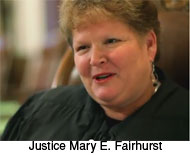Article from: www.thenewspaper.com/news/37/3769.asp
4/18/2012
Washington Supreme Court Opens Access to Accident Reports
Washington Supreme Court rules against state police effort to hide accident reports.
 The public has a right to view accident reports made by police, Washington state's highest court decided Thursday. In a 7-2 ruling, the justices ordered the Washington State Patrol to hand over all documents related to accidents on the Montlake Bridge involving bicycles. Michael W. Gendler had requested the material under the Public Records Act, but the state police refused to comply, fearing the papers would be used in a lawsuit against the state.
The public has a right to view accident reports made by police, Washington state's highest court decided Thursday. In a 7-2 ruling, the justices ordered the Washington State Patrol to hand over all documents related to accidents on the Montlake Bridge involving bicycles. Michael W. Gendler had requested the material under the Public Records Act, but the state police refused to comply, fearing the papers would be used in a lawsuit against the state.
At first, the Washington State Patrol said it would only provide accident reports if Gendler identified the people involved in the collision and the exact date of the incident. It also said only the state Department of Transportation (DOT) had the information. The agency also insisted Gendler sign a disclaimer.
"I hereby affirm that I am not requesting this collision data for use in any current, pending or anticipated litigation against a state, tribal or local government involving a collision at the location(s) mentioned in the data," the collision data request form stated.
Gendler did want to sue the state, so he refused to sign and filed suit against the state patrol for violating the public records statute. The state police claimed they were exempted from complying with the request because a provision of federal law allows states to compile data on the most dangerous roads for the purpose of applying for federal safety grants. To encourage honesty from the states, the federal law protected these reports from court discovery, ensuring they could be used in a lawsuit.
The state Supreme Court majority sided with Gendler, arguing the state police role in collecting accident reports existed long before the federal grant program.
"WSP cannot shield otherwise disclosable accident reports under the guise of Section 409 by depositing them in a forbidden DOT electronic database," Justice Mary E. Fairhurst wrote. "Permitting this would fly in the face of our well grounded principle that technology should enhance access to information that is necessary for justice, not create barriers."
Because Gendler won a public records case, the court ordered the state to pay all of his attorneys' fees.
A copy of the decision is available in an 80k PDF file at the source link below.
Source: Gendler v. Batiste (Washington Supreme Court, 4/12/2012)
Permanent Link for this item
Return to Front Page
 The public has a right to view accident reports made by police, Washington state's highest court decided Thursday. In a 7-2 ruling, the justices ordered the Washington State Patrol to hand over all documents related to accidents on the Montlake Bridge involving bicycles. Michael W. Gendler had requested the material under the Public Records Act, but the state police refused to comply, fearing the papers would be used in a lawsuit against the state.
The public has a right to view accident reports made by police, Washington state's highest court decided Thursday. In a 7-2 ruling, the justices ordered the Washington State Patrol to hand over all documents related to accidents on the Montlake Bridge involving bicycles. Michael W. Gendler had requested the material under the Public Records Act, but the state police refused to comply, fearing the papers would be used in a lawsuit against the state.